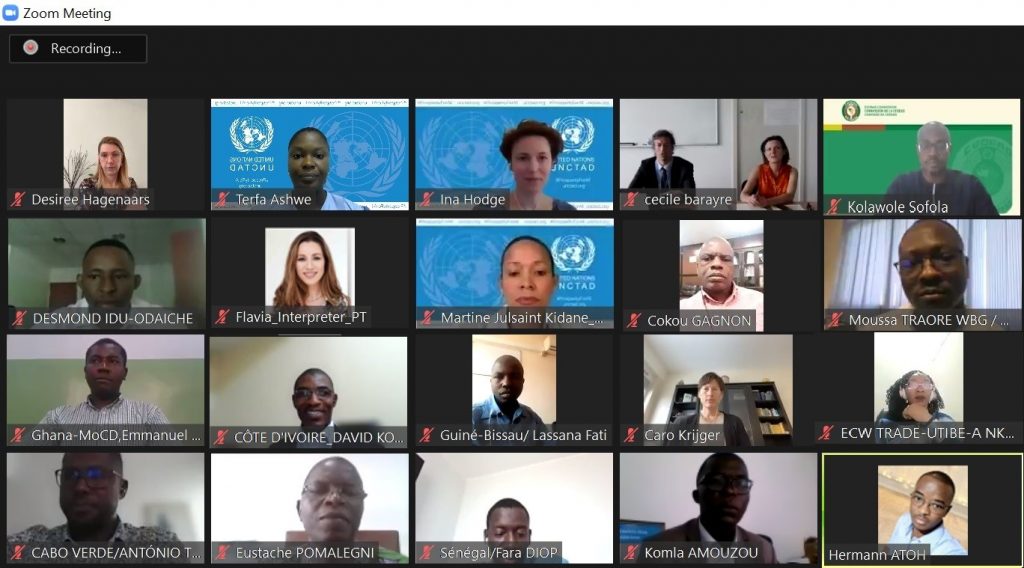ECOWAS Senior Officials on Trade and Information Communication Technology (ICT) Consider Areas of Intervention for an ECOWAS E-commerce Strategy.
Regional Senior officials from Ministries and Agencies responsible for Trade and ICT, met remotely on the 12th of May 2022 to consider orientations for an ECOWAS E-Commerce Strategy at the 3rd Regional Meeting on the Development of an ECOWAS E-Commerce Strategy.
The meeting was convened by the ECOWAS Commission in partnership with the United Nations Conference on Trade and Development (UNCTAD), to review the progress that has been made since the 2nd Regional Meeting, which was held on the 14th of March 2022, and areas of intervention for a regional e-commerce strategy.
Mr. Mickson Opoku, Director for Bilateral, Regional and Multilateral Trade, Ministry of Trade and Industry, representative of Ghana, who served as the Chair of the meeting, noted the relevance of this next phase in preparing the ECOWAS E-Commerce Strategy. In commending the Commission for the initiative, Mr Opoku noted how an E-Commerce Strategy for the region would allow ECOWAS Member States to better take advantage of the African Continental Free Trade Area (AfCFTA).
Representing Mr. Tei Konzi, Commissioner for Trade, Customs and Free Movement, Mr. Kolawole Sofola, Ag. Director for Trade in his welcome message highlighted the achievements of the project and the finalization of the Regional eTrade Readiness Assessment for ECOWAS. He thanked Member States and partners, for their cooperation and contribution to the success of the assessment exercise and for their commitment to ensuring that the process was transparent and inclusive of public and private sector input.
In their welcome remarks Ms. Desiree Hagenaars, Policy Coordinator, Trade for Development, Department for Sustainable Economic Development, Directorate General International Cooperation, Ministry of Foreign Affairs, the Netherlands and Ms. Cécile Barayre-El Shami, Chief, Digital Economy Capacity-building section, Division on Technology and Logistics, UNCTAD, congratulated Member States on reaching this milestone. Ms. Desiree Hagenaars noted that this was a good time to invest in digital given its potential for economic growth and development, access to new markets and opportunities for increased productivity.
Participants considered the presentation by UNCTAD and provided their feedback on the orientations for the e-commerce strategy. Member States noted the proposed areas for intervention, which centred on the need to; i) Strengthen and coordinate actions of trade ministries of Member States to make e-commerce a contributor to national and regional industrial efforts; ii) Enhance trust of potential e-commerce actors through the harmonization and update of the legal framework; iii) Monitor, follow-up and accompany the e-commerce sector; and iv) Adapt the strategic framework to priorities, objectives and targeted actors (including women and youth).
Member States also highlighted the need to ensure that the Regional E-Commerce Strategy was in alignment with the regional and continental agenda on trade integration and inclusive digital transformation.
About the ECOWAS E-Commerce Strategy Development Project
The ECOWAS E-Commerce Strategy Development Project is an initiative of the ECOWAS Commission, implemented in partnership with the United Nations Conference on Trade and Development (UNCTAD) and funded by the Kingdom of Netherlands.
Website
ECOWAS: https://ecowas.int/, ECOWAS Trade Information System
UNCTAD: Regional e-commerce strategy development for the Economic Community of West African States



